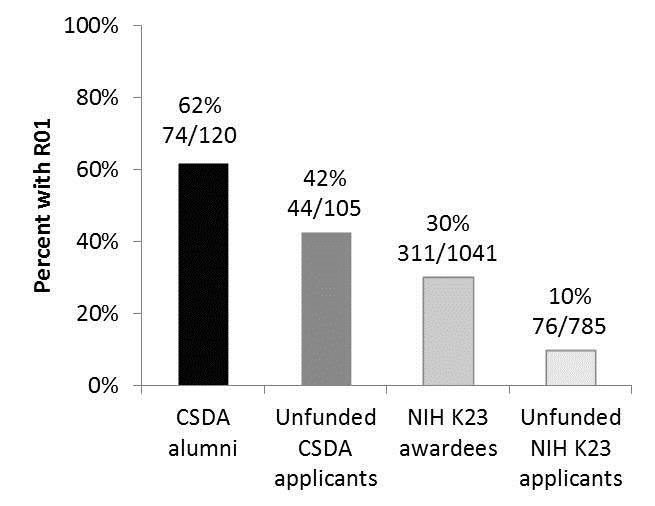In 2011, 13 years after the inception of the Clinical Scientist Development Award (CSDA) program, we set out to answer whether the award had a measurable impact on the careers of CSDA alumni and whether these individuals remained in research careers. For our analyses, we focused on 120 alumni who completed at least three years of CSDA-supported research as faculty members and who received their awards between 1998 and 2007. The transition to independence of CSDA alumni, measured as the percent that became principal investigators on a National Institutes of Health investigator-initiated R01 grant, was compared with CSDA applicants that ranked highly in the competition but were not funded. Whether CSDA alumni remain in research post-award was determined through a survey.
 As direct health care providers, physician scientists are ideally positioned to question the scientific underpinnings of human disease and to analyze options for its prevention, diagnosis and treatment. Unfortunately, over the past several decades, there has been a decline in the number of U.S. physicians pursuing research. As of 2011, the year of the most recent estimate, [1] only 1.3% of all U.S. physicians reported research as their main professional activity, compared with approximately 2% in 1999[2]. Equally distressing is that early career physician-scientists are discouraged from the research path, as indicated by the estimated 34% to 44% attrition rate from academic medicine for first-time assistant professor physicians at U.S. medical schools.[3] These numbers may result from a number of factors, including the arduous process of developing a research program, competing clinical and research responsibilities, and inadequate professional guidance and institutional support.
As direct health care providers, physician scientists are ideally positioned to question the scientific underpinnings of human disease and to analyze options for its prevention, diagnosis and treatment. Unfortunately, over the past several decades, there has been a decline in the number of U.S. physicians pursuing research. As of 2011, the year of the most recent estimate, [1] only 1.3% of all U.S. physicians reported research as their main professional activity, compared with approximately 2% in 1999[2]. Equally distressing is that early career physician-scientists are discouraged from the research path, as indicated by the estimated 34% to 44% attrition rate from academic medicine for first-time assistant professor physicians at U.S. medical schools.[3] These numbers may result from a number of factors, including the arduous process of developing a research program, competing clinical and research responsibilities, and inadequate professional guidance and institutional support.
For these reasons, the Medical Research Program at the Doris Duke Charitable Foundation has long believed it is important to provide research support for early career physician-scientists and, in response, launched the Clinical Scientist Development Award (CSDA) in 1998. This award provides research funds for investigators to conduct mentored clinical research during a period of institutionally endorsed, decreased clinical responsibilities. CSDA support is expected to enable early-career physician-scientists with their transition to independent grant funding.
We are proud to have supported an outstanding group of early career physician-scientists and to further productive research careers through our CSDA program. At the following link, we’re pleased to share the complete results of the analyses, which were published in the journal Academic Medicine in November 2013: The Doris Duke Clinical Scientist Development Award: Implications for Early-Career Physician Scientists.